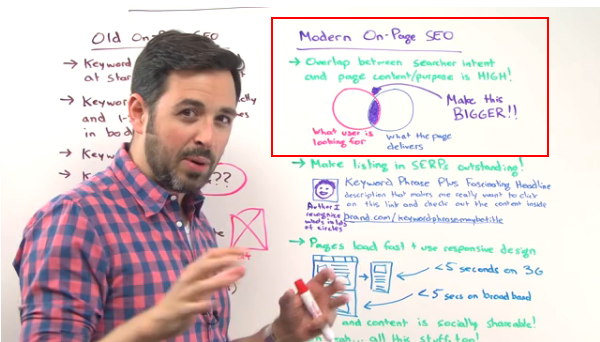You already know that page titles, exactly & partial match search phrases in text, semantic urls, headlines, alt attributes, internal link anchors, and usage of related terms matter in on-page SEO. And they still do. But search engines evolve, so too do the factors that play a role in on-page SEO practices.
Rand does a nice job articulating this in his most recent Whiteboard Friday:
Searcher Intent & Page Content Purpose
This idea that SEOs should strive for overlap between the searchers’ intent & a page’s content purpose really isn’t new. However, it’s definitely gaining more attention.
And as search engines get better at matching searcher intent with page purpose, the importance of on-page factors is likely to continue to grow.
And of course, the best way to anticipate where search engines are headed and keep your pages popular and relevant, is to design them for the users.
What is this user looking for? What does the user want?

Make listings in search results outstanding
Do you have any experience with paid search? If so, you should be applying some of the principles for creating a paid search ad to your organic strategy. In other words, be conscientious and purposeful about how your pages appear in organic search results. This means paying particular attention to:
- Page Titles
- Meta Descriptions
- URLs
- Structured Data
All of these elements are used by search engines to create listings.
So, don’t forget your on-page SEO fundamentals. But also don’t limit yourself to those basic factors. Think about your on-page SEO in the greater content of delivering to your users that which they are searching for.